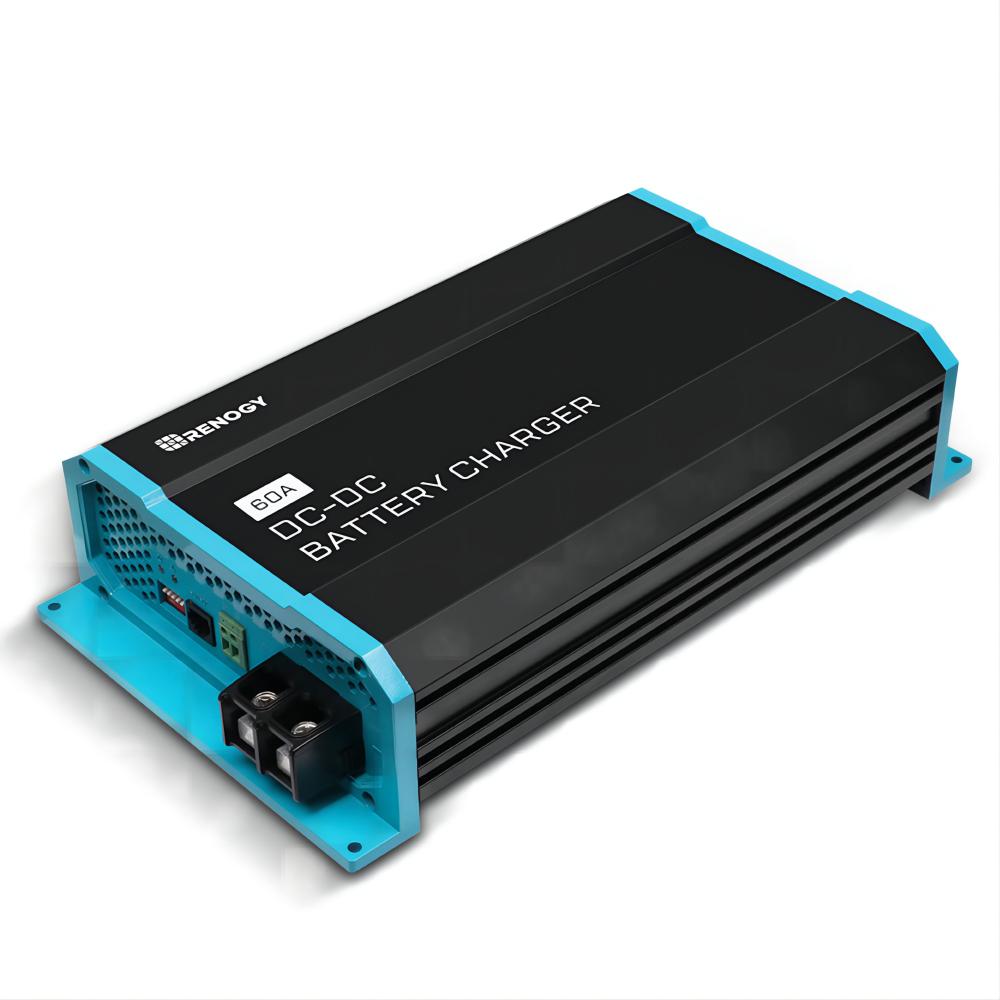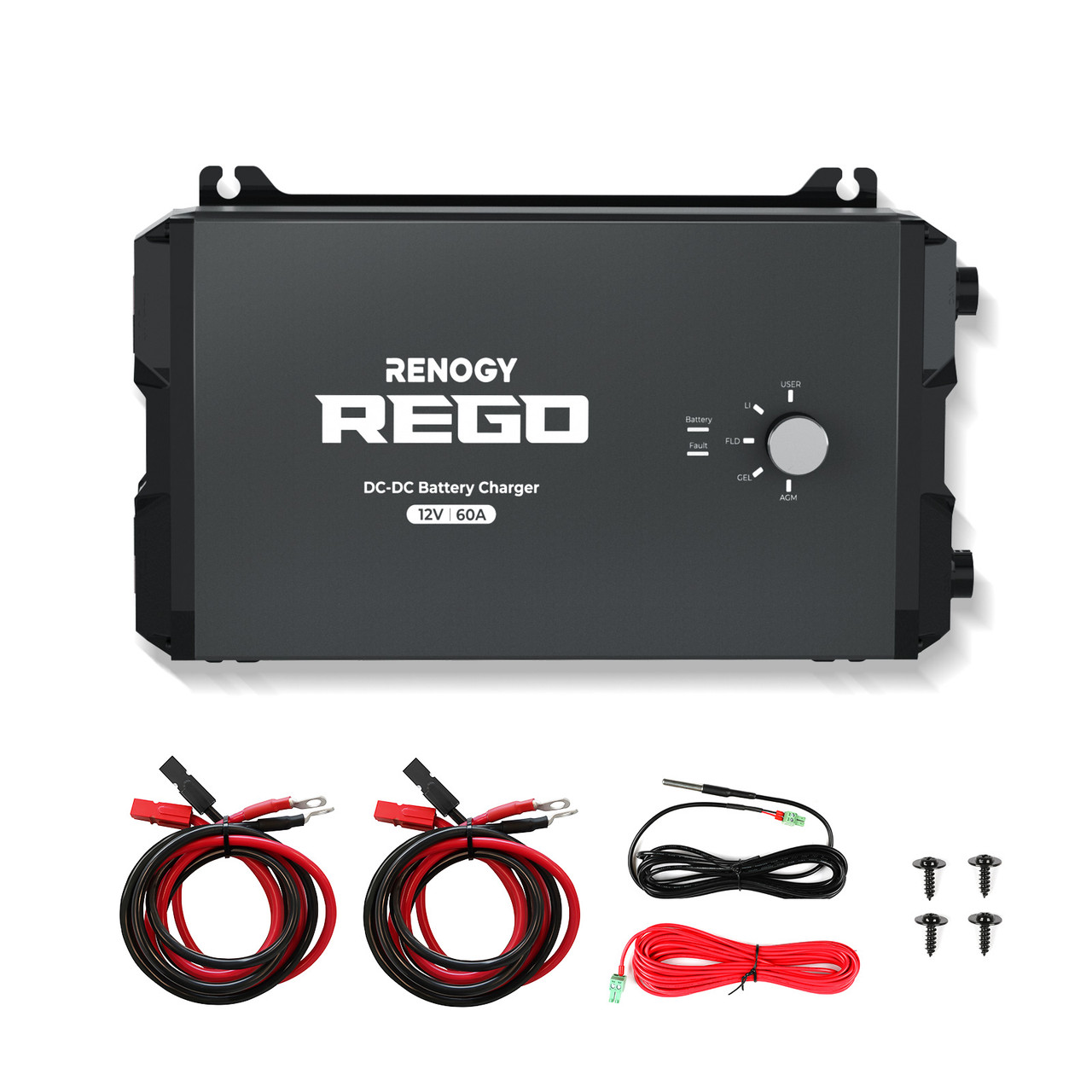What does a DC to DC battery charger do?
If you're trying to work out what kind of battery charger you'll need, you've come to the right place. This article will explore DC to DC battery chargers, what they are, what they're for, and how to use them.
AC or DC?
If you're new to solar power, you may not be familiar with the terminology used for different types of electrical current. AC/DC is not just the name of a band; it refers to two common types of electrical current.
What does AC mean?
AC stands for alternating current, and AC power is the type of current that comes from the electrical grid in most houses. Most common household appliances and electronics will run on AC power.
What does DC mean?
DC stands for direct current and is used in many vehicles and many small appliances in RVs, boats, or off-grid cabins. DC can power devices such as lights, fans, and even refrigerators. All solar panels produce DC energy. DC is the type of energy stored in batteries of all kinds.
What is a DC to DC Charger?
Solar power has many benefits as a simple, reliable, eco-friendly, and efficient source of energy. However, one of the downfalls of solar power is that you may find yourself without sufficient sunlight to charge your solar batteries on some rare occasions. In these situations, you may need an alternative means to recharge your battery.
AC to DC chargers or DC to DC chargers make great alternative options in these rare situations where solar power is not enough. DC to DC chargers rely only on the energy from one battery to charge another battery. Because they work with two batteries, DC to DC chargers can also be called "battery to battery chargers" or "B2B chargers".
DC to DC Chargers are commonly used to charge batteries using the power of your vehicle's alternator. Every vehicle on the road today has a battery to power its systems when the engine is not running. And when the engine is running, a device called an Alternator is used to charge this battery. The alternator is incredibly similar to a generator.
How do DC to DC chargers work?
With a DC to DC charger, it's possible to use the same generator that your vehicle uses to charge its operating battery, to charge your off-grid battery. Your vehicle's alternator generates DC energy to feed the vehicle's electrical system and charge the starter battery while you drive.
By using a DC to DC charger, you can manage the current so that you not only can charge an off-grid battery from your car's battery. But it will also manage the current to extend the life of the already installed automotive components.
DC to DC charging can be so efficient that you can skip using solar panels altogether. However, the dependability of DC to DC charging will depend on your vehicle use if you use lots of electricity in your vehicle to run your A/C, car stereo, lights, etc. The more energy you use running the vehicle and its appliances, the less excess DC energy you will have available to charge your battery.
Much of the appeal of camping, traveling in an RV, or living off-grid is to get in touch with nature and enjoy some peace and quiet. So the last thing you want is to hear the humming of your gas generator.

DC to DC Chargers or Isolators
A DC to DC charger sits between your vehicle's alternator and manages the current to both batteries on the system. In contrast, an isolator diverts power where it sees fit.
One problem with isolators is that they do not work as well with today's modern smart alternators in vehicles. This is because today's smart alternators are incredibly efficient and only run when required to produce just enough power to keep the vehicle's battery charged. There is simply no extra power available to charge your off-grid battery, and it can take much longer than a DC to DC setup.
It's not often the case that the most straightforward option is the best option, but this is the case here. In most applications, a DC to DC solution will be more suitable than an isolator.
What is an On-Board DC to DC Charger?
On-board DC to DC chargers are energy solutions that get permanently installed in boats or other vehicles, unlike transportable devices. A charger like the Renogy 12v DC To DC On-Board Charger is a great vehicle charging solution.
On-board chargers can be installed easily and used on vehicles such as cars, vans, boats, and more. For boats, the DC to DC charger will be plugged into a dockside outlet for use when the boat is in port. For vehicles, you can plug them into an outlet located in an RV parking area.
The Renogy 12V DC to DC On-Board Battery Charger is an excellent choice for permanent installations. This product will charge your secondary batteries while you drive, utilizing the primary battery connected to the alternator. Your car or vehicle's alternator prioritizes your starting battery, so you don't ever have to worry about starting the vehicle. This system allows your solar power system to charge your service battery first. You can keep yourself fully charged and off-grid longer.
How do DC to DC chargers work with Solar Power?
DC to DC chargers and solar power are two common ways to produce energy without being connected to the grid. It's possible to use the two systems together, but more often, they work as a backup for one another. For example, many van dwellers install solar panels on their vans, but sometimes the solar power produced isn't enough for all your appliances. You can use a DC to DC charger to get an energy boost from your vehicle's battery in these situations.
The power generated from these two energy sources is handled separately from each other. The standard way that this is set up is to have both a B2B charger and a separate Solar Charge Controller in order to charge the off-grid batteries.
Combination charge controllers & DC to DC alternator chargers
Currently, a few units are available on the market that are a combination of DC-DC and Solar Charge Controllers built into one unit. These DC-DC chargers can accept solar power as a charging method thanks to in-built solar regulators. This can lessen your vehicle's alternator load and is great if you don't plan to drive every day. For example, it's handy to have a DC to DC charger that accepts solar if you plan to park and stay in one location for an extended period. This way, you can keep batteries charged even when you're not driving and engaging the alternator.
The right portable generator for you will be the model that best suits your use case; before you start looking for the best portable solar generator, you should consider how you plan to use it. If you want to power all your household appliances in an emergency, you'll need a bigger battery. If you just want to charge your phone and small electronics while camping, you can choose a small solar generator.
These combination charge controllers & alternator chargers aren’t much more expensive and give you the best of both worlds. A combination charger like our DCC50S 12V 50A DC-DC On-Board Battery Charger with MPPT makes for a convenient multi-purpose option.
If you have lithium iron phosphate batteries, you can also use some products, like Renogy 20A AC-to-DC Charger with a wall outlet.

What is the function and application of a 12V DC to DC charger?
DC to DC chargers are an ideal battery charger for use with any 12V battery power system. Most modern vehicles use a 12V battery, and the electrical components such as the lighting, starter, and ignition systems are all designed to operate on 12 volts.
A DC to DC battery charger works with a 12V battery by isolating your main 12V battery system from the vehicle's alternator. The DC to DC charger will then boost the charge of the main battery to maximize its charging capacity. This process will allow you to get your battery 100% charged after a day of driving.
One of the most significant benefits of a DC to DC charger is they don't interfere with starter battery charging. This benefit makes it an ideal application for 4WDs, RVs, motorhomes, and other vehicles. DC to DC chargers increase the chance of your 12V batteries always being at close to a full charge. A DC to DC battery charger can minimize damage to your 12V battery system and prevent over-discharging when used correctly.
What size DC to DC charger do I need?
If you are thinking of getting a DC-DC charger, you'll need to consider the appropriate size and amps required. Before choosing a charger, you'll need to work out how much energy you will need to power your desired electronics and appliances on a single charge.
As a general rule, a 75-200AH battery bank will require a 25-amp dual battery charger. If you have higher capacity needs, then a 40-amp dual battery charger may be more suitable. Renogy offers many charger options in varying sizes.
The Benefits of DC to DC chargers
DC to DC battery chargers are ideal for frequent travelers and van lifers. If you're traveling around the country off the grid, then those hundreds of miles of driving can be used to charge your battery when you are camping.
DC to DC charger can also be convenient in adverse weather or geographies where bright sunny days are not normal. Knowing that a simple drive to your next stop can charge your alternator and, thus, your electronics is comforting knowledge.
With almost every road-worthy vehicle currently carrying a full charging system onboard, it makes sense to keep a DC to DC charging system as a backup or primary power source for off-grid life.
While we love solar power at Renogy, we recognize that all charging options come with pros and cons. You should consider all the potential issues that come with the three most common charging options:
- Alternators: DC to Dc charging with an alternator has plenty of benefits, as this article has outlined. However, it does have one major flaw. A vehicle does need to be running for quite some time if you want to get a meaningful charge from your alternator. A quick 15-minute drive isn’t going to cut it, and won’t produce much energy. Compared to solar panels, the charge potential is pretty limited. Solar panels work to generate solar energy all day, but the alternator only works when the engine is running.
- Solar: solar panel kits have the potential to produce energy all day long, not just while you’re driving. But, cloudy, overcast days can happen. Depending on where you are living or traveling for the winter, this could be a big issue.
- Shore Power: Of course, you can always plug into the grid or an outlet to charge your batteries. But often, this is not possible and is a more expensive option. Sure, there’s no sun or driving necessary with this option. But you do need to be near an outlet in an RV park or at home, so it’s not a suitable option if you’re on the road or boondocking.
Full-proof charging
When all charging options come with pros and cons, it can be challenging to decide which option is best for your lifestyle. The simple answer is, don’t rely on just one.
If you're living off the grid, it's safer not to depend on only one technology to get you by. Things happen, car batteries die, and rainy overcast days can occur. Solar panels can be a great source of eco-friendly energy for much of the year. But for rainy or cloudy days you can invest in a DC to DC battery charger and have peace of mind that your batteries can always be charged.
By having multiple sources of power generation, you can full-proof your dream off-grid lifestyle. We recommend having both a DC to DC charger and a portable solar generator or solar panel solution available when living off-grid.
Explore our entire range of Renogy products to find the perfect energy solution for your setup.
See other related articles to learn more:
Solar Panels 101: A Beginner's Guide
The Ultimate Guide To DIY Off-Grid Solar Systems
Do solar panels increase home value
how efficient are solar panels
How Many Solar Panels Do I Need








